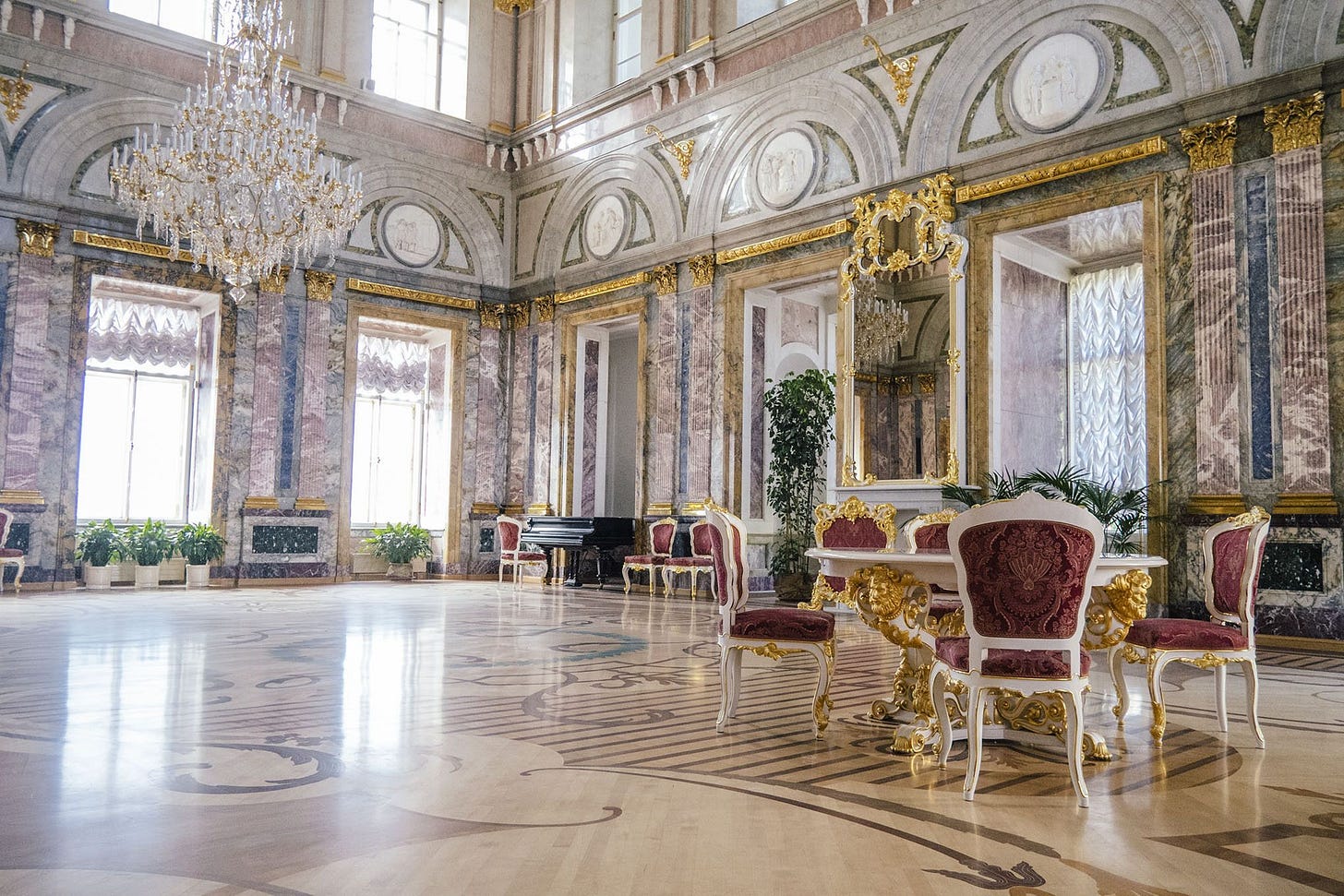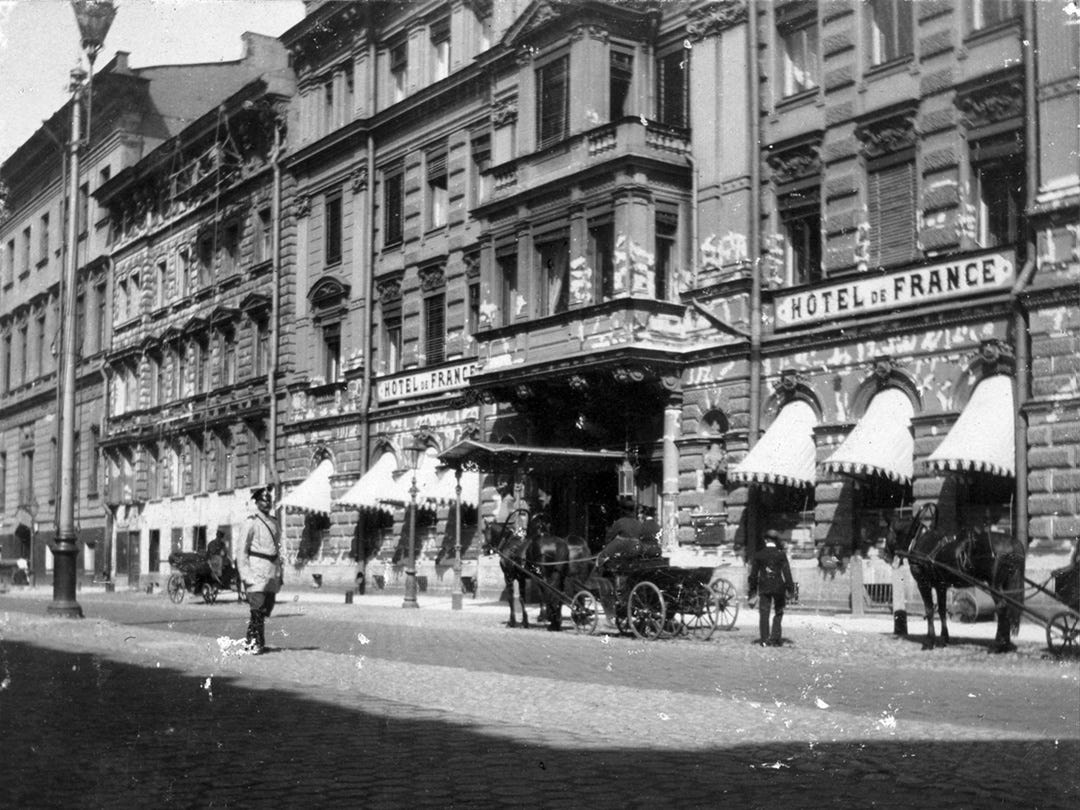
27 January 1880. Sunday
In the morning, together with Father Isaiah, we went to the Marble Palace for the Divine Liturgy. Upon our arrival, he began the Proskomedia, while I took the opportunity to inspect the Palace: the rotunda, in the center of which stands a jasper vase; to the right, the grand dining hall; a chamber where the choir rehearsed on the gallery for the liturgy; to the left—the family rooms, several halls adorned with books and collections of coins and medals; the garden and the white hall, where, in the center, stands an organ and where concerts are held every Friday; models of ships, various machines, cannons; weaponry (a whip with which a brigand beat his victim to death, a bayonet with which a sentinel in Rome slew a mad bull, and other such items), gifts presented to the Grand Duke: two hussars, a cadet at the helm—silver figurines; stone paperweights and countless other items.
In the Church: particles of the Life-giving Cross, various holy relics, stones from the Lord's Tomb and that of the Theotokos, a cross carved of wood by the Grand Duke himself in Palestine; the finger of the Holy Martyr Marina, on whose feast day in 1857 the Grand Duke was saved from shipwreck. A small oratory stands at the center of the Church, filled with numerous prayer books on lecterns and seats designated for the Grand Duke and Alexandra Iosifovna.
Present at the service were Grand Duke Konstantin Nikolaevich himself and his sons—Konstantin and Dmitry; the Grand Duchess was ill with erysipelas on her face and leg. During the Great Litany, the royal family was commemorated up to the children of Grand Duke Konstantin Konstantinovich; during the Great Entrance—up to the heir and his children, as is customary. The choir was excellent; the iconography was strictly Byzantine.
After the service, which lasted an hour and a quarter, Father Isaiah and I drank a cup of coffee in the family room. Ilya Alexandrovich Zeleny invited us for the following Sunday to be introduced to the Grand Dukes.
We visited Ivan Vasilyevich Rozhdestvensky to congratulate him on his Name Day, where we encountered Chistovich and Nilsky—then to Zheverzheev’s, where we had a small repast of caviar and sardines upstairs—then to Archpriest Pariysky at the Church of the Nativity on the Sands, who had expected me for dinner, having also invited Grudzev, a master in silverwork; he had collected thirty-five rubles from two women of his parish for the Mission, which he handed over on the spot.
Around the eighth hour, Alexander Nikolaevich Vinogradov arrived; he volunteered, even at his own expense, under the expected salary arrangement, to bring a technical painter to Japan. Also Archimandrite Arkady Filinov (Smolyak) arrived, the newly appointed local clergyman in rotation, a neighbor.
At eight, Vinogradov and I proceeded to Count Putiatin’s, where I spent the night. In the evening, I had a long conversation with Olga Yefimovna regarding a rather stern letter she had received from her spiritual father, Father Juvenaly, concerning her desire to join the Mission.
28 January 1880. Monday
On the return from the Putiatins, I stopped by the Vladimirsky Archpriest Sokolov regarding a church donation. Again, no success: courteous words and promises to accompany me to the churches of his deanery “when time allows.”
Upon my return, I found a letter from Byutsov on the table and composed a reply. At the second hour, I went to the “Department of Personnel” to M. N. Nikonov, according to Baron Rosen’s notice that he wished to speak with me. Evidently, due to the ambiguity of the wording in the document from the State Council, Nikonov had the impression that 4,800 rubles were to be taken away from them, whereas in fact, that sum was still needed to maintain a priest, chanter, and the Embassy Church.
I explained that Father Anatoly was intended to be the rector of the Embassy Church, while the vicar would be supported with funds amounting to 3,695 rubles from another source, and thus the matter was settled. Nikonov, with utmost courtesy, promised to immediately write a response to the State Council, affirming that the Ministry of Foreign Affairs had no objection to establishing a vicariate in Japan. He also remarked that Struve had greatly assisted in furthering the idea of a bishopric under the Spiritual Authority. Well now! Who fears whom, and who obstructs whom? The Ministry of Foreign Affairs or the Holy Synod?
At Nikonov’s I also encountered our rector in Rome. On the way back, I searched for “Hotel de France” for quite a while, having walked right past it beneath the arch on Bolshaya Morskaya. On Morskaya Street, I met Osada and Oomai; I bowed to the Grand Dukes Konstantin Konstantinovich and Aleksei Alexandrovich, who were passing by in carriages; the latter was particularly handsome and splendid—how majestically he raised his hand to his visor!
I did not find Baron Rosen at home and left my card. Proceeding to the Lavra, I beheld all the grandeur of Nevsky Prospect at three o’clock; it was a rare day for Petersburg, and thus along Nevsky, down to its mouth, the strolling throngs moved as a solid mass: ladies posing in carriages, coaches, droshkies, the clatter and bustle—how much life, movement, and what a multitude of thoughts, dreams, anxieties, envy, hatred, intrigue—evaporates heavenward from this very place!
For contrast, I stopped at both old cemeteries in the Lavra: only the distant city hum could be heard here—and how peacefully and quietly do all those now rest, who once too had shone and lived upon Nevsky. At the entrance I was distracted by a small boy chipping away at his icy hill with a splinter of wood, and then something in particular drew me to the grave of Maria Savvishna Perekusikhina—was she not once at the very heart of all court intrigue under Catherine? And behold—she too lies silent beneath this stone, upon which her name now strikes the eye with something almost scandalous.
At a quarter to nine, I set off for Vasily Vasilyevich Grigoriev, the orientalist, now head of the Press Affairs Department, by his invitation at Kornilov’s (“and I, truthfully, was expecting you,”—and he appointed the time—Monday evening, at his home). In the drawing room his wife was seated with some ladies and ushered me through the library into the study; there were already three elderly men and one young scholar, just returned from Germany. Vasily Vasilyevich introduced me as, so to speak, a “famous missionary to Japan,” but did not name any of those present.
The young man yielded his seat “closer to the host,” and the latter jokingly began to commend the elderly neighbor as a prospective missionary to Japan; the old man then related how he once wrote a Passion Week sermon as a model for a law instructor, which was in fact delivered by the latter.
More elderly gentlemen arrived. I did not recognize Konstantin Andreevich Skachkov, nor he me, and we sat and conversed for some time as strangers, until I inquired: “Might you not be Mr. Skachkov?” I also failed to recognize Nikolai Petrovich Semyonov, who later identified himself and told a tale of an Indian—the nephew of “Nana Sahib”—now residing in Petersburg, who had befriended Grand Duke Konstantin Konstantinovich during an expedition and had later been pushed away.
Also present was I. P. Kornilov, who kindly invited me to dinner at his home, and at once began listing whom among the “Orientals” to invite. To the arriving guests they served tea, then grapes and apples. Among them was a taciturn cavalryman, an aide-de-camp to General Skobelev during the last war, evidently very intelligent, judging by his inquiries about Japan.
At midnight I departed, having received two copies of the host’s book Russia and Asia, and his promise to gather more books for the Mission.
Translation Notes
“gratis” — Latin for "free of charge"; preserved in original context.
Erysipelas — retained the 19th-century medical term for a skin infection.
Perekusikhina — Historical identification matches Maria Savvishna Perekusikhina, a known lady-in-waiting of Empress Catherine II; tone suggests irony at her current obscurity.
Passion Week sermon — Context suggests Holy Week, “Strastnaya Pyatnitsa” being Good Friday.
Never-Asked Questions (NAQ):
Why is St. Nicholas writing all these entries from St. Petersburg? I thought he was the missionary to Japan?
St. Nicholas began his missions work before the Diaries, and apparently decided to begin the diaries while on a trip to Russia.
When’s he going to get back to Japan?
In November of 1880, he set back out towards Japan, connecting through Kiev and Hong Kong. I skipped ahead to answer these questions myself. There are still quite a few entries left between now and then. :)








